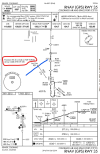Michael Porowski
Filing Flight Plan
- Joined
- Dec 4, 2022
- Messages
- 4
- Display Name
Display name:
MSki
I am an IFR student in Denver; I often fly approaches at KAPA.
I am confused by the NA note on RNAV 35 shown in the plan view area that says "Procedure NA for arrivals on FQF VORTAC airway radials 078 CW 220." I understand this to mean the approach is NA if arriving on an airway within radials 078 clockwise to 220. But why? I can't fathom why this would be a problem in this airspace.
My CFII said this note actually means there is no procedure turn from these inbound radials. This makes more sense but the actual note on the plate says nothing about a PT. I'm not sure if my CFII is making up BS (it wouldn't be the first time).
If anyone knows this approach and why, I would love to hear the reason.
Thanks
I am confused by the NA note on RNAV 35 shown in the plan view area that says "Procedure NA for arrivals on FQF VORTAC airway radials 078 CW 220." I understand this to mean the approach is NA if arriving on an airway within radials 078 clockwise to 220. But why? I can't fathom why this would be a problem in this airspace.
My CFII said this note actually means there is no procedure turn from these inbound radials. This makes more sense but the actual note on the plate says nothing about a PT. I'm not sure if my CFII is making up BS (it wouldn't be the first time).
If anyone knows this approach and why, I would love to hear the reason.
Thanks





